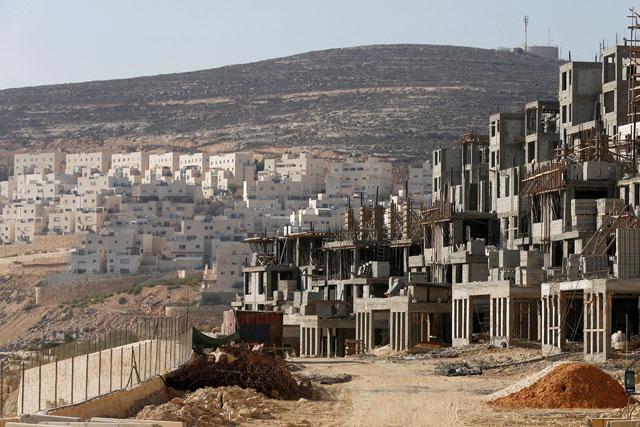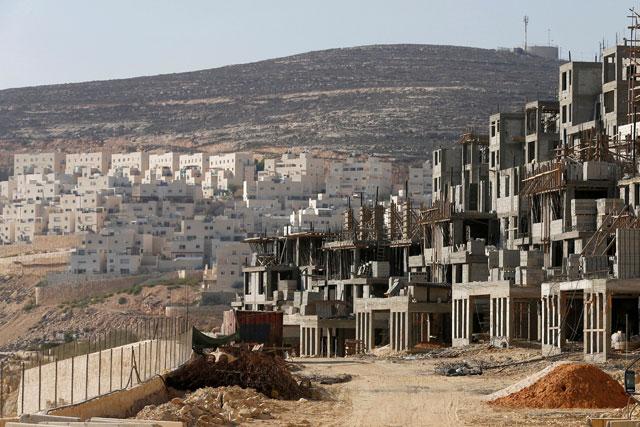You are here
Egypt, pressured by Israel, delays UN vote on settlements — diplomats
By Reuters - Dec 22,2016 - Last updated at Dec 22,2016

A construction site is seen in the West Bank Jewish settlement of Givat Zeev, near Jerusalem, October 17, 2013 (Reuters photo)
UNITED NATIONS/OCCUPIED JERUSALEM — Egypt postponed a UN Security Council vote on Thursday on a resolution it proposed demanding an end to Israeli settlement building, diplomats said, saying Cairo acted under pressure from Israel.
A vote would have forced US President Barack Obama to decide in his last month in office whether to shield Israel with a veto, or, by abstaining, to register criticism of the building on occupied land that the Palestinians want for a state.
Obama has been considering whether to lay out parameters for a solution or to allow a critical resolution through the Security Council before he steps down in the hopes this might ultimately help to end the conflict.
In a sign that they feared Obama might abandon the United States' long-standing diplomatic protection for Israel at the United Nations, Trump and Israeli Prime Minister Benjamin Netanyahu urged the White House to veto the draft resolution.
President Abdel Fattah Al Sisi of Egypt, which in 1979 became the first Arab nation to make peace with Israel, put off the vote because of pressure from Israel, diplomats said.
"Every member of the Security Council was ready to vote at 3pm," said a Western diplomat on condition of anonymity. "Egypt has delayed the vote following an intense Israeli lobbying campaign against them."
Any council member can propose a draft resolution. Council member Egypt worked with the Palestinians to draft the text.
It was not clear whether a vote would be rescheduled. Diplomats said a final decision on whether to push ahead with the draft resolution would be made after a meeting of some Arab ministers in Cairo later on Thursday.
Constructive relations with Trump?
Officials in Netanyahu's office spoke to Egyptian officials on Thursday about postponing the vote, an Israeli diplomat said.
It was not clear what pressure Israel may have put on Egypt but there are several ways it could do so, including curtailing Israeli security cooperation in Egypt's fight against Islamist militants in the Sinai desert.
An Egyptian diplomat suggested Cairo may have put off the vote in part to maintain good relations with the incoming Trump administration.
“We [Arab states] are all looking for a way to ensure constructive relations with this new administration. It’s not clear if this [resolution]helps that, or if it might even hinder,” said the diplomat, who spoke on condition of anonymity.
Netanyahu took to Twitter in the dead of night in Israel to make the appeal for a veto, in a sign of concern that Obama might take a parting shot at a policy he has long opposed and at a right-wing Israeli leader with whom he has had strained ties.
Hours later, Trump backed fellow conservative Netanyahu on one of the most contentious issues in the Israeli-Palestinian conflict and the pursuit, effectively stalled since 2014, of a two-state solution.
He said the resolution would put “Israel in a very poor negotiating position and is extremely unfair to all Israelis”.
Egypt circulated the draft Wednesday evening and the 15-member council had been due to vote at 3pm (2000 GMT) on Thursday.
It was unclear how the United States, which has protected Israel from UN Security Council action, would have voted.
US Secretary of State John Kerry had planned to make a speech to explain the US stance on Thursday but cancelled it after the vote was postponed, a US official said.
The resolution would demand Israel “immediately and completely cease all settlement activities in the occupied Palestinian territory, including East Jerusalem”.
The draft text put forward by Egypt says the establishment of settlements by Israel has “no legal validity and constitutes a flagrant violation under international law”.
It also expresses grave concern that continuing settlement activities “are dangerously imperilling the viability of a two-state solution”.
The White House declined comment.
Obama critical of settlements
Obama’s administration has been highly critical of settlement construction in the occupied West Bank and East Jerusalem. US officials said this month, however, the president was not expected to make major moves on Israeli-Palestinian peace before leaving office in January.
Netanyahu said the United States “should veto the anti-Israel resolution at the UN Security Council on Thursday”.
Israel’s far-right and settler leaders have been buoyed by the election of Trump, the Republican presidential candidate. He has already signalled a possible change in US policy by appointing one of his lawyers, a fundraiser for a major Israeli settlement, as Washington’s ambassador to Israel.
Netanyahu, for whom settlers are a key component of his electoral base, has said his government has been their greatest ally since the occupation of the West Bank and East Jerusalem in a 1967 war.
Israel considers all of Jerusalem its capital, a claim that is not recognised internationally.
The United States says continued Israeli settlement building lacks legitimacy, but has stopped short of adopting the position of many countries that it is illegal under international law. Some 570,000 settlers live in the West Bank and East Jerusalem.
A resolution needs nine votes in favour and no vetoes by the United States, France, Russia, Britain or China to be adopted.
Related Articles
UNITED NATIONS, United States — The United States has requested a closed-door UN Security Council meeting for Thursday at which President Do
OCCUPIED JERUSALEM — Benjamin Netanyahu has been unrelenting in his criticism of the Obama administration over what he condemned as its "sha
OCCUPIED JERUSALEM — Israel scrambled Saturday to contain the fallout from a UN Security Council vote to halt settlements in Palestinian ter















